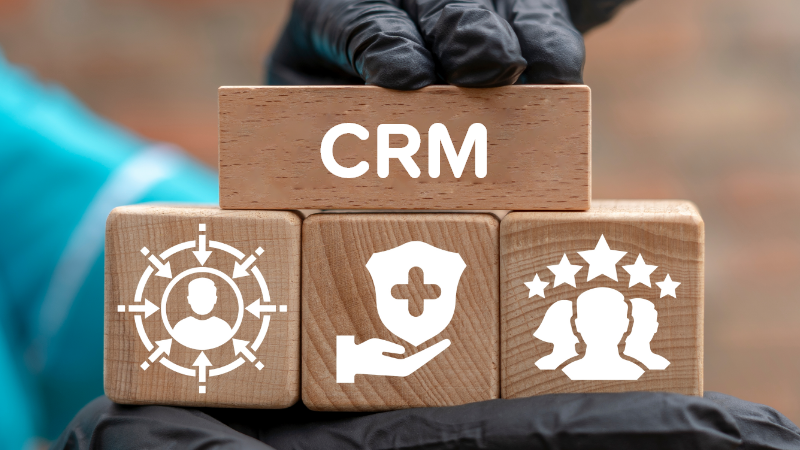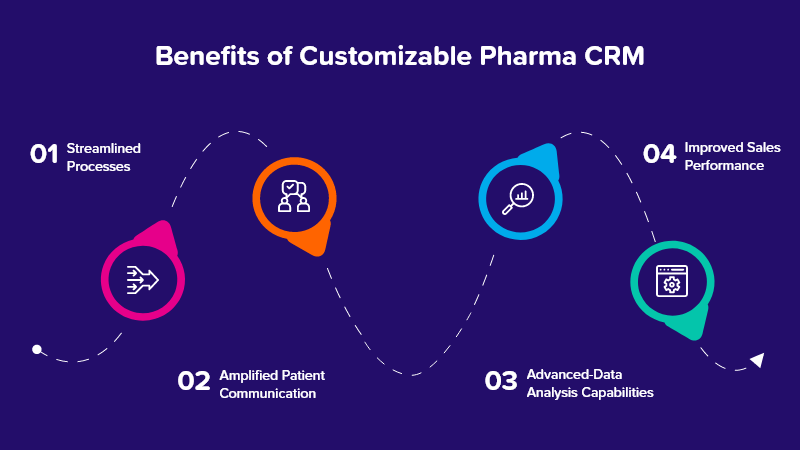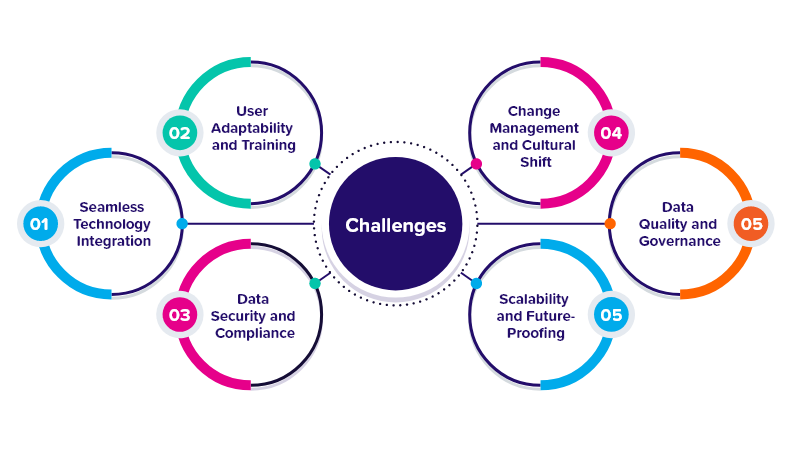Admittedly, new customer acquisition is good news. After all, new customers are the indicator that your business is actually growing.
But onboarding new clients without a plan to make them stick to you — well, that’s both exhausting and unsustainable.
Unfortunately, one of the most important factors in customer retention in the pharma industry is also the most overlooked:
Customer Relationship Management (CRM) System.
That is why today we are decoding the role of a CRM in the pharma industry and how a well-built CRM can help pharma companies to drive better outcomes, especially where patients are at the heart of the industry.
- Decoding CRM in Pharma Industry
- What exactly is CRM in the context of the pharma industry?
- The Power of Customization in Pharma CRM
- Benefits of Customizable Pharma CRM
- The Challenges in Implementing Customizable Pharma CRM
- Case Study: Successful Implementation of Customizable Pharma CRM
Decoding CRM in Pharma Industry
In pharma, the key to success lies not only in acquiring new customers but also in retaining them. Customer Relationship Management (CRM) systems, often overlooked, play a crucial role in customer retention within the pharma industry.
So, that brings us to the next big question.
What exactly is CRM in the context of the pharma industry?
CRM refers to a comprehensive system that enables pharmaceutical companies to effectively manage their relationships with various stakeholders, including healthcare providers, patients, and even sales representatives. It serves as the backbone of modern patient-centric healthcare systems, allowing companies to navigate the intricate dynamics of the industry and drive better outcomes.

At its core, CRM in pharma is about fostering meaningful and personalized interactions with patients. It involves capturing and organizing vast amounts of data related to patient profiles, medical histories, treatment plans, and more. By centralizing this information, a well-built CRM system empowers pharma companies to gain valuable insights, make informed decisions, and deliver tailored experiences to patients.
Moreover, a robust CRM system enhances communication and collaboration across departments within a pharmaceutical organization. It enables seamless coordination between sales, marketing, and customer service teams, ensuring a unified approach in managing relationships and addressing the unique needs of healthcare providers and patients.
In today’s patient-centric era, where the focus is on delivering personalized healthcare experiences, CRM becomes an indispensable tool for pharma companies. It facilitates the customization of patient interactions, allowing for tailored messaging, targeted campaigns, and individualized care plans. By leveraging the power of CRM, pharmaceutical companies can build stronger relationships, enhance patient engagement, and ultimately improve patient outcomes.
Now let’s talk about
The Power of Customization in Pharma CRM
The importance of customization in pharma CRM cannot be overstated. It’s no secret that the pharmaceutical industry operates within a complex landscape, characterized by intricate regulatory requirements, diverse product portfolios, and rapidly evolving market dynamics. A one-size-fits-all CRM approach simply won’t cut it. That’s why having a CRM system that can be tailored to meet the unique needs of the industry is crucial for success.
In Pharma CRM, customization is all about personalization. It allows companies to capture and organize data specific to patients, such as their profiles, medical histories, and treatment plans. This wealth of information enables pharma companies to gain valuable insights, make informed decisions, and deliver individualized experiences to patients.
But customization doesn’t stop there. It also fosters communication and collaboration across different departments within a pharmaceutical organization. Sales, marketing, and customer service teams can work together seamlessly, ensuring a unified approach to managing relationships and addressing the specific needs of healthcare providers and patients.
In today’s patient-centric era, delivering personalized healthcare experiences is paramount. That’s where CRM that is customizable shines. It enables tailored messaging, targeted campaigns, and individualized care plans, leading to stronger relationships, higher patient engagement, and ultimately, better patient outcomes.
The beauty of customizable CRM systems is that they empower pharma companies to adapt to the ever-changing dynamics of the industry. Whether it’s streamlining processes, optimizing workflows, or gaining a competitive edge, customization gives pharma companies the flexibility they need to thrive.
In the next section, we’ll dive deeper into the benefits of customizable Pharma CRM. We’ll explore how it streamlines processes, amplifies patient communication, unlocks advanced data analysis capabilities, and boosts sales performance. We’ll also take a closer look at how Platforce a customizable CRM made for the pharma industry can help.
Benefits of Customizable Pharma CRM
Now that we understand the power of customization in Pharma CRM, let’s explore the specific benefits it brings to the table. A customizable CRM system tailored to the unique needs of the pharmaceutical industry offers a range of advantages that contribute to better patient-centric outcomes.
- Streamlined Processes: Customization allows pharma companies to align their CRM system with their specific workflows and processes. By eliminating unnecessary steps and automating repetitive tasks, a customized CRM optimizes efficiency and productivity, freeing up valuable time for sales representatives and other teams to focus on building relationships and delivering personalized experiences to patients.
- Amplified Patient Communication: Customization enables tailored messaging and personalized communication with patients. By capturing and organizing patient data such as profiles, medical histories, and treatment plans, a well-built CRM system facilitates individualized interactions. This personalized approach enhances patient engagement, fosters trust, and improves adherence to treatment plans, ultimately leading to better patient outcomes.
- Advanced-Data Analysis Capabilities: Customizable CRM systems provide powerful data analysis tools that enable pharma companies to extract meaningful insights from the vast amount of data they collect. By leveraging data analytics, companies can identify trends, track patient behaviour, and gain a deeper understanding of their target audience. These insights empower informed decision-making, allowing companies to refine their strategies, optimize campaigns, and deliver more targeted interventions.
- Improved Sales Performance: Customization in Pharma CRM boosts sales performance by providing sales teams with a comprehensive view of their customers and prospects. By tailoring the CRM system to capture and analyze sales data, customer preferences, and buying patterns, sales representatives can identify opportunities, tailor their pitches, and deliver value-based solutions to healthcare providers. This personalized approach enhances customer satisfaction, increases sales conversions, and builds long-term loyalty.

Next, we’ll be exploring the potential
The Challenges in Implementing Customizable Pharma CRM
While the benefits of customizable CRM systems in the pharmaceutical industry are undeniable, implementing such a solution comes with its own set of challenges. These challenges need to be carefully addressed to ensure seamless integration and maximize the potential of a customized Pharma CRM.
- Seamless Technology Integration.
One of the primary challenges in implementing a customizable Pharma CRM is ensuring seamless integration with existing systems and technologies. Pharmaceutical companies often have complex infrastructures with multiple software solutions already in place. Integrating a new CRM system requires careful planning, collaboration with IT teams, and customization to fit into the existing ecosystem. This challenge can be resolved by conducting a thorough analysis of the current technology landscape, identifying integration points, and leveraging APIs and data connectors to establish a seamless flow of information between systems.
- User Adaptability and Training.
Introducing a new CRM system, especially one that is highly customizable, requires user adaptability and training. Pharmaceutical sales and marketing teams, as well as other stakeholders, need to understand the system’s features, benefits, and customization options. Adequate training programs, workshops, and ongoing support are essential to ensure a smooth transition and user adoption. Clear communication about the value and impact of customization on their day-to-day activities can help overcome resistance and facilitate the adoption process.
- Data Security and Compliance.
Pharmaceutical companies deal with sensitive patient data, making data security and compliance a top priority. When implementing a customizable CRM system, it is crucial to ensure that data privacy regulations and industry-specific compliance requirements are met. Robust security measures, such as encryption, access controls, and regular data backups, must be in place to protect patient information and maintain compliance. Working closely with IT and security teams, as well as adhering to industry standards, will help mitigate potential risks.
- Change Management and Cultural Shift.
Implementing a customizable Pharma CRM like Platforce often requires a cultural shift within the organization. Traditional processes and ways of working may need to be reevaluated and transformed to align with the new workflow. Also, training, and support, are crucial to facilitate this cultural shift. It’s essential to communicate the benefits of customization, such as improved efficiency, enhanced patient communication, and data-driven decision-making, to gain buy-in from employees at all levels. By involving key stakeholders early in the process and fostering a collaborative environment, resistance to change can be minimized, and a positive mindset towards customization can be fostered.
- Scalability and Future-Proofing.
As the pharmaceutical industry evolves, so do the requirements of CRM systems. Implementing a customizable Pharma CRM should not only address the current needs but also anticipate future demands. Scalability and flexibility become crucial factors to ensure that the CRM system can accommodate growth, changing regulations, and emerging technologies. Choosing a CRM solution that offers a modular architecture and the ability to easily add or modify functionalities will help future-proof the system and enable seamless adaptation to evolving business needs.
- Data Quality and Governance.
Customizable CRM systems provide organizations with extensive data collection and analysis capabilities. However, this also brings challenges related to data quality and governance. It is important to establish clear data governance policies, data validation processes, and quality control measures to ensure the accuracy and reliability of the information captured within the CRM system. Regular data audits, data cleansing activities, and data stewardship roles can help maintain data integrity and maximize the value derived from the CRM system.

By proactively addressing these challenges and implementing best practices, pharmaceutical companies can successfully navigate the implementation of a customizable CRM system. Careful planning coupled with stakeholder involvement, and a focus on user adoption and data security, organizations can unlock the full potential of customization and leverage it to achieve better patient-centric outcomes.
To make this blog more practical, let’s look at how a customizable CRM like Platforce has helped Danone an industry leader with its customizable CRM.
Case Study: Successful Implementation of Customizable Pharma CRM
At the forefront of the pharmaceutical industry, the successful implementation of a customizable CRM system can make all the difference in driving better patient-centric outcomes. In this case study, we will explore how Platforce a customizable CRM solution, helped Danone, a global food and beverage company, to reinforce sales effectiveness and enhance healthcare professional (HCP) engagement in seven countries.
Danone, recognized the need to gain a comprehensive understanding of how sales representatives engage with healthcare professionals. To achieve this, Platforce was selected as the CRM of choice due to its flexibility to be fully customized to meet business needs.
Platforce facilitated the measurement of touchpoints per day and per representative, coverage, and frequency, providing a holistic view of sales force performance. Collaborating with the Platforce team, Danonen managed to develop field force performance dashboards for seven markets, including Uzbekistan, Sri Lanka, Ecuador, Azerbaijan, El Salvador, Panama, and Bulgaria. With around 130 Danone team members utilizing Platforce CRM daily, each market had its own KPIs tailored to stimulate workflow and improved feedback.
The successful implementation of Platforce has enabled Danone to
- optimize its sales force effectiveness
- gain valuable insights into HCP engagement
- enhance patient-centric outcomes
By leveraging the flexibility to customize along with Platforce’s advanced features, Danone has solidified its position as a leader in the pharmaceutical industry, effectively adapting to evolving market dynamics and meeting the unique demands of its target audience.
Contact us to find out what’s possible for your brand with Platforce’s customizable CRM. You can also follow our content on YouTube and LinkedIn.
